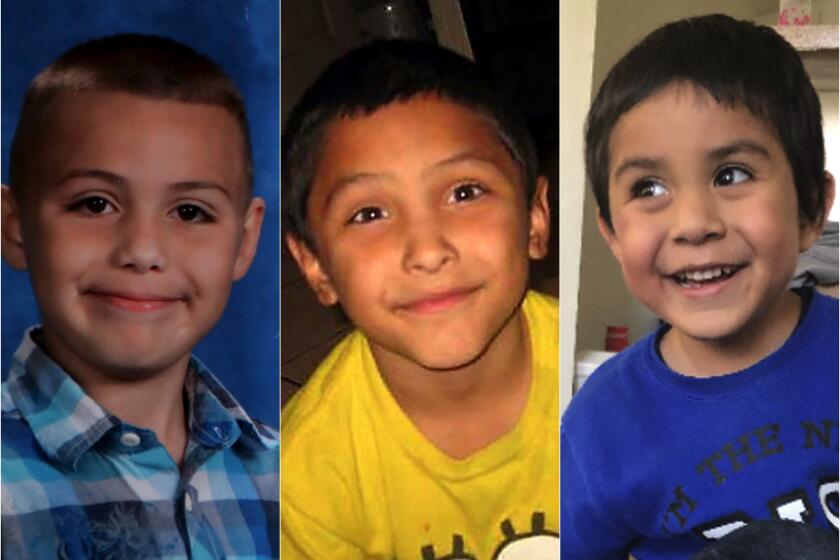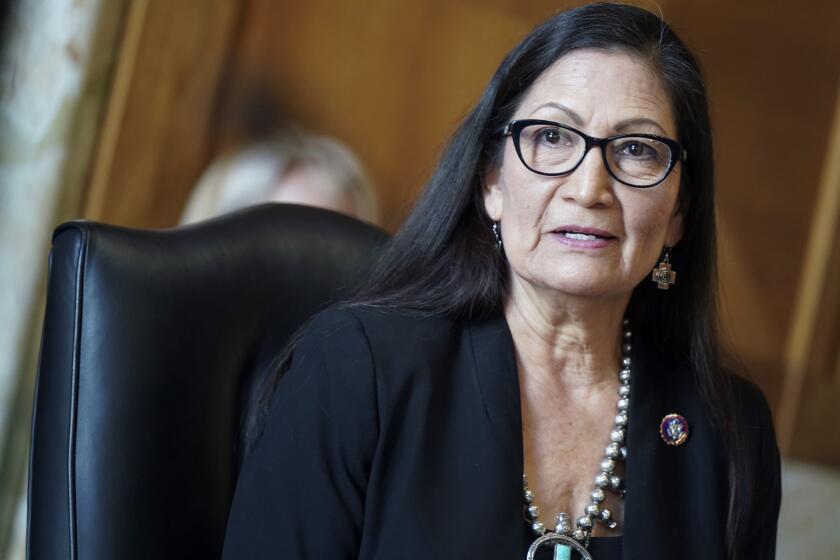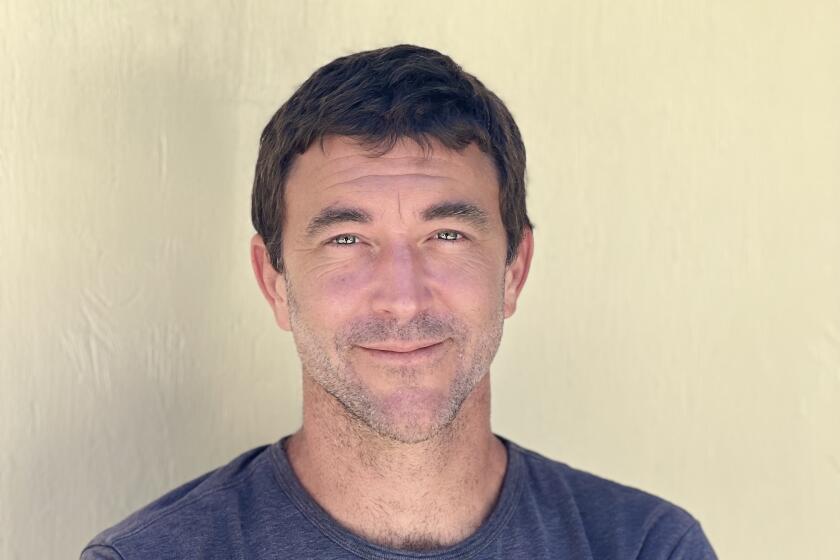Two women murdered their adopted Black kids. One writer sought out the birth families
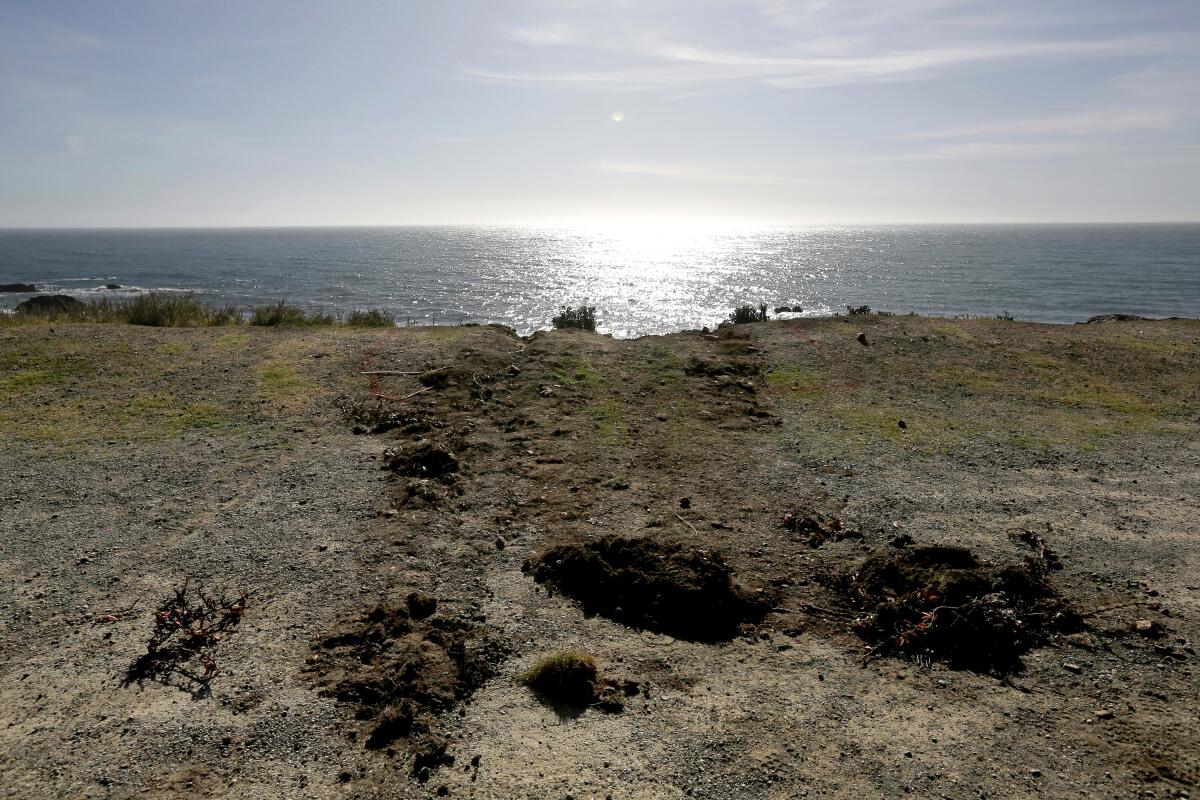
On the Shelf
We Were Once a Family: A Story of Love, Death, and Child Removal in America
By Roxanna Asgarian
FSG: 320 pages, $28
If you buy books linked on our site, The Times may earn a commission from Bookshop.org, whose fees support independent bookstores.
Nearly five years ago, Jennifer and Sarah Hart murdered their six adopted children — Ciera, 12; Abigail and Jeremiah, both 14; Devonte, 15; Hannah, 16; and Markis, 19; by drugging them with Benadryl and then intentionally driving off a cliff on California’s Pacific Coast Highway. The Harts were white, their children Black or biracial. Devonte’s body has never been found.
The title of Roxanna Asgarian’s new book on the case, “We Were Once a Family,” does not refer to the Harts. It refers, directly and emphatically, to the birth families of these two sets of children who were taken from their homes and communities by Child Protective Services in Texas, fostered by the Harts and fast-tracked to adoption despite family members who were willing and able to take the children into their homes.
Shortly after the crash, revelations flooded in. The Harts had been accused of child abuse many times, with Sarah given a suspended jail sentence in 2011. Teachers had filed numerous complaints over the children’s welfare. The Harts had pulled them from school. How did the system respond? By giving the Harts three more children.
“Unlike many who’d investigated the Harts’ story, I was not drawn in by Jennifer’s and Sarah’s psychological motivations,” Asgarian writes. “What motivated me most was to see, and to share, the parts of the story that had been made invisible: The real and complicated families that these children came from. The children themselves.”
Anthony, Noah, Gabriel and beyond: How to fix L.A. County DCFS
“We Were Once a Family” is a deeply disturbing account of how the failure of the child welfare system led directly to the murder of six children of color. In telling their stories, Asgarian gives voice to the families who were robbed of their children in the most devastating way imaginable. The author spoke to The Times about her five-year journey with the book. The interview from her home in Dallas has been edited for length and clarity.
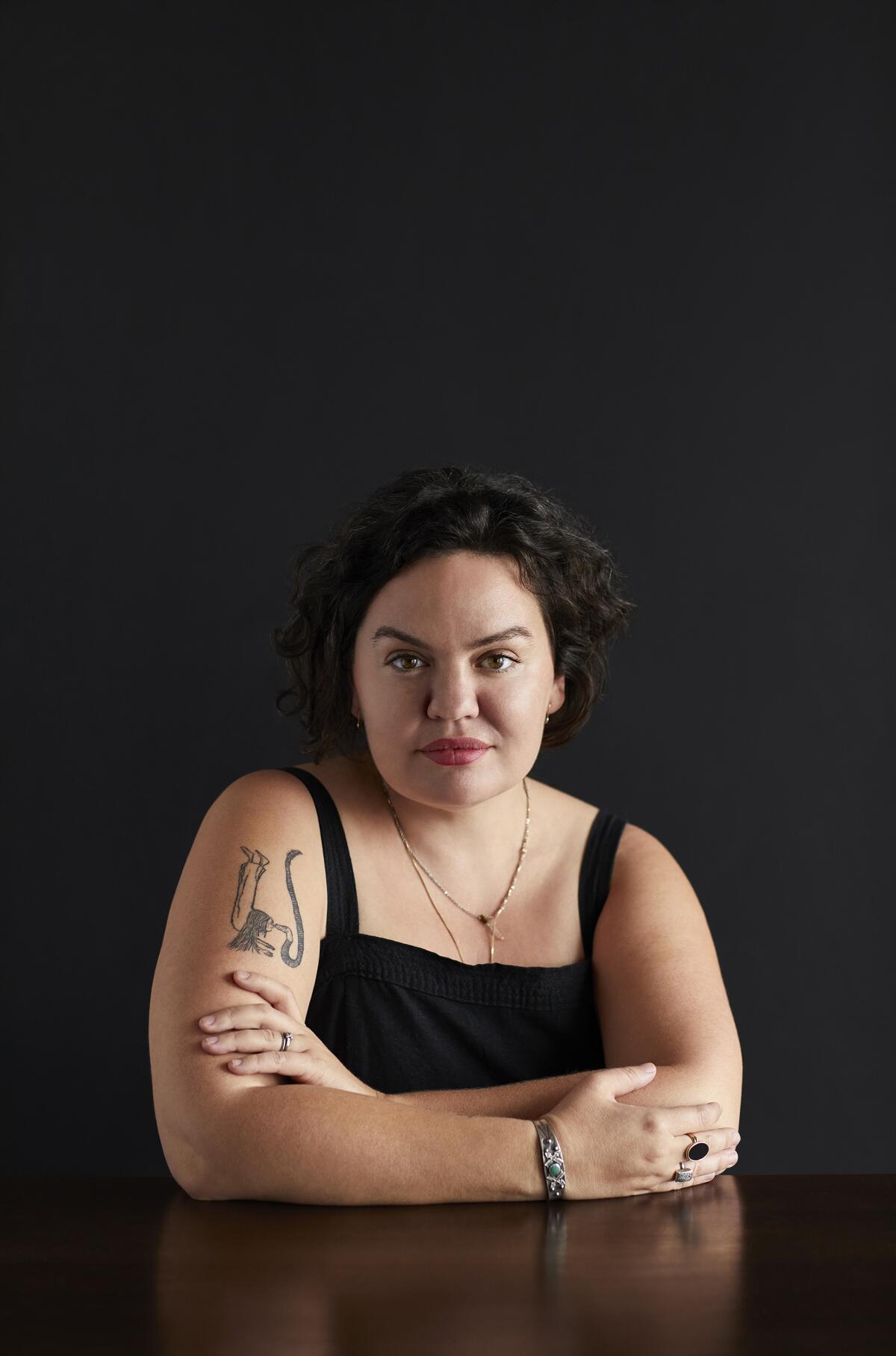
When you heard about the murders, did you immediately know this was a story about the failures of the system?
I was bowled over by the enormity of the loss, so it took me a little bit of time to process it. One of the followup stories I read said three of the kids came from Harris County and that was where I was living at the time. As soon as I started reporting, I knew it was a child welfare story.
When was it clear to you that you would tell the story of the birth families rather than the Harts?
There have been several documentaries about the Hart family, and there was a lot of information about them coming out after the crash. It felt like the families were almost deleted from the record. I had been there with them, and seeing their lives and grief, and not seeing it in these stories really made me angry.
No one called Tammy, the birth mom of one set of siblings, to tell her what happened. Tammy went to the police to give a DNA sample and they publicly released a press release before they told her she was a match — a failure of basic humanity. The families felt like an afterthought. Everyone is so interested in what happened to these kids, but not their families?
And all you ever read in the media was how the kids had supposedly come from abusive backgrounds.
Yes, and that was very much Jen’s story on Facebook. All you read was that Sherry, the birth mother of the other set of siblings, was a cocaine addict. Seventy-five percent of child welfare cases are around neglect, not abuse. Neglect is living in conditions of poverty. Mom had to go to work. The kids have to stay home alone. The electricity went out because we couldn’t pay the bills. These are not parenting issues. These are issues with our society. There’s something so primal about someone telling you, “You are unable to parent.”
I appreciated that you brought in the history of Indigenous adoption and trans-racial adoption in this country.
Breaking up families is actually one of the U.N. definitions of genocide. It’s so deeply wounding. I tried to bring in a lot of Native experience with the childcare welfare system. It makes it so clear the intergenerational effects. We know that racism is real, and yet we keep asking: How could this happen? With this story there’s no getting around the difference in treatment.
Indigenous leaders have long asked the U.S. to take accountability for severing children from their families, language and religion.
When two family members were working hard to adopt these children permanently, their cases were dismissed. Meanwhile, the Harts are on a fast track, their abuse ignored.
We talk a lot about how overburdened the childcare welfare system is, but we don’t talk about how much of that time is used for investigation on families who haven’t done anything wrong. There’s this idea that foster families are great, they’re selfless. There’s so much scrutiny on Black parents trying to parent. You let these people adopt six kids from two family groups, which is an extreme amount of work. To give people that responsibility without doing the due diligence and following up is horrifying.
What was the most emotionally challenging part of writing this book?
I think writing about Ye [the son of Dontay, the only sibling of Ciera, Jeremiah and Devonte who was not adopted]. How he entered the foster system, that was the most difficult part. Ye is about nine months older than my son, and we would strap him into my son’s car seat to visit Dontay in prison. I went to every hearing. Just seeing it up close was really ...
Hard on you personally?
I’ve been taking a break from thinking about it since I finished writing it. I’ve been thinking about the effect that this book has had on me. And you develop relationships.
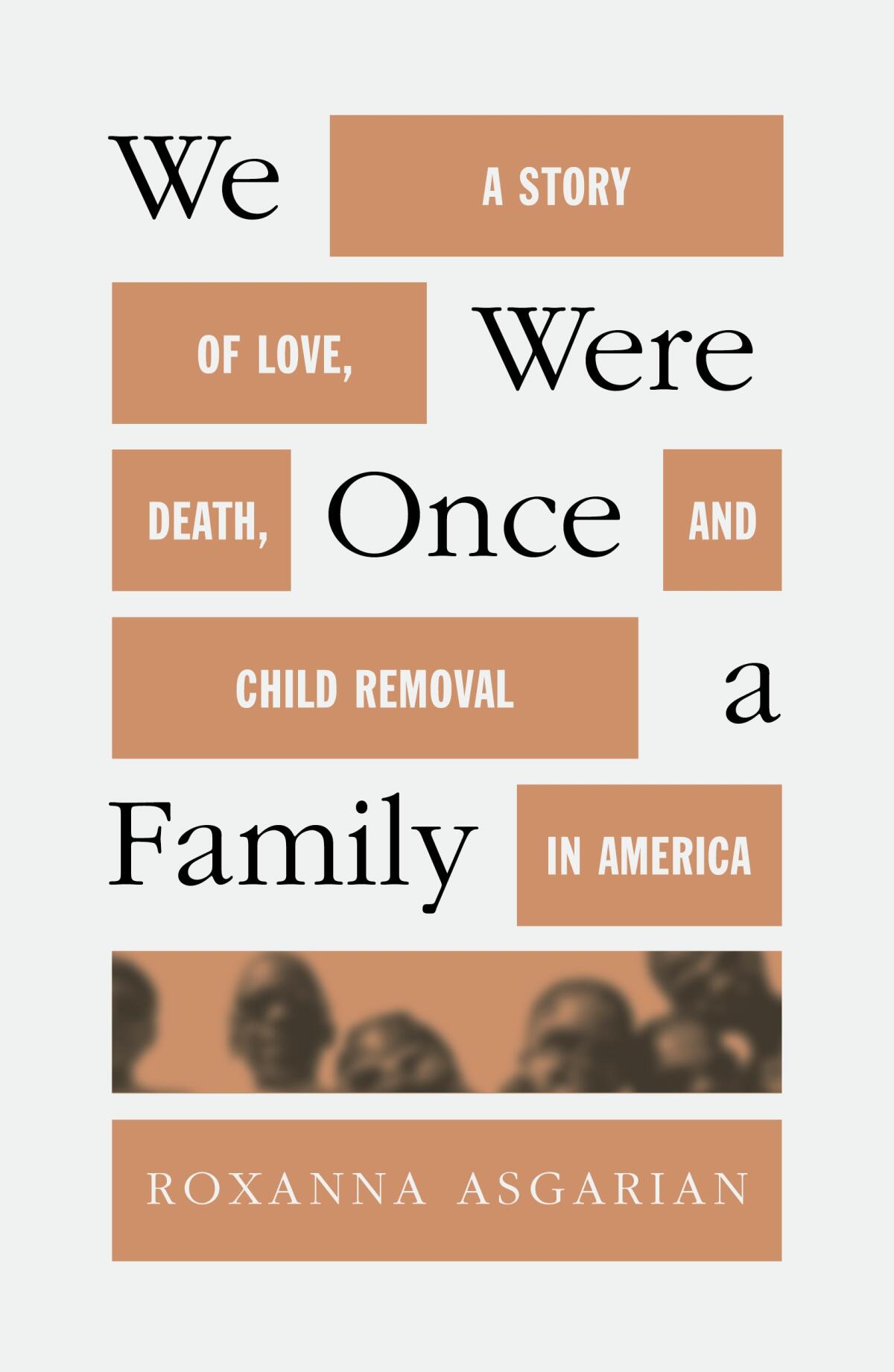
Is there anything the Biden administration could do to prevent these things from happening? Or to make it more difficult for these cases to fall through the cracks?
As Dorothy Roberts writes in her book “Torn Apart,” you eventually come around to abolitionism because this system can’t be fixed. It needs to be completely torn down and rebuilt. The punitive aspect of the system is the fundamental nature of this system, and it’s not good for children. If they can’t do best at home, they do best with their family members. We give kinship families less money than foster families. We don’t give parents money!
The child tax credit is huge. That makes a real, tangible difference. CPS only bothers kids in poverty. We could increase the legal protections for parents who are involved in the child welfare system. There’s problems with the quality of representation and when parents are appointed attorneys. The system is downstream of the entire failure of supporting people with housing, healthcare, drugs, mental healthcare — this is the catch-all area. There are a lot of things we can do outside the childcare welfare system that would have a huge effect.
In ‘Children of the State,’ award-winning writer Jeff Hobbs spent months inside juvenile facilities. It was an experience of heartbreak and hope.
What do you want birth parents to know about their rights?
In the face of an investigation, Google your state and the rights you have as a parent. It varies from state to state. There are legal helplines you can call. I want all parents to know: No one is a perfect parent. There are so many ways to feel guilty as a parent. If you are involved in CPS, it doesn’t dictate anything about you as a parent. It’s not a fair system. People have been broken psychologically by this. Families have been destroyed. It’s not right.
I could spend a lot of time asking you questions like, “How did this happen?” or “Why did we allow this to happen?” In my notes from the book there are many questions like this, primal scream exclamation marks.
There’s an unknowable aspect to this. It’s normal and human to wonder how someone could possibly do this. But you can’t answer that psychological question because you’re not them. Where we put our focus says a lot about us. The tragedy is about the children. They should be the focus.
Ferri is the owner of Womb House Books and the author, most recently, of “Silent Cities San Francisco.”
More to Read
Sign up for our Book Club newsletter
Get the latest news, events and more from the Los Angeles Times Book Club, and help us get L.A. reading and talking.
You may occasionally receive promotional content from the Los Angeles Times.
